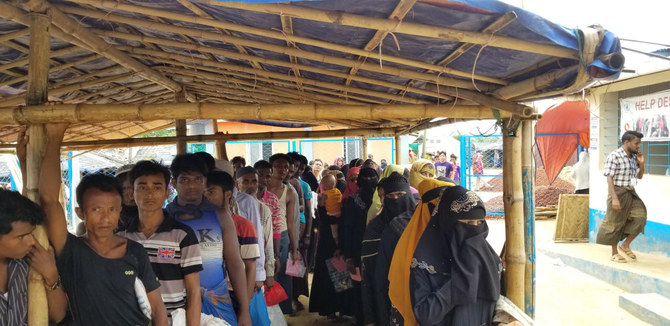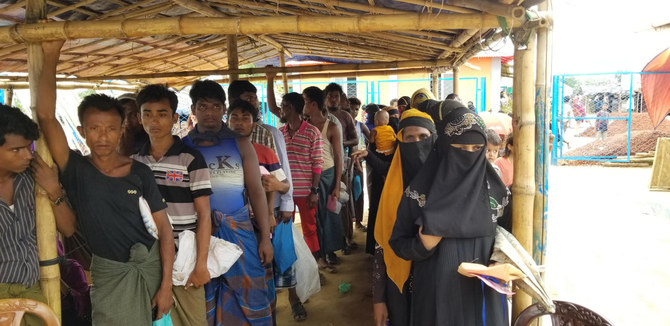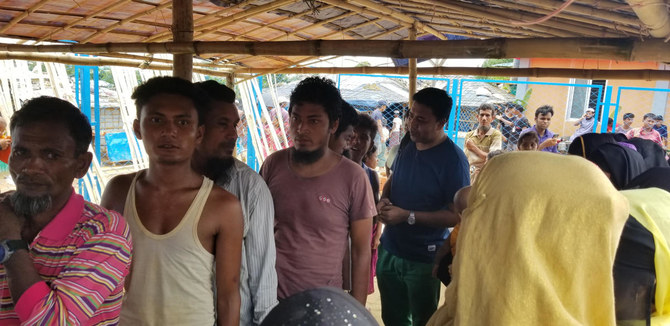DHAKA, Bangladesh: It was in the evening of June 18 in Dhaka that I received a call from my office for a special assignment to mark World Refugee Day on June 20. Just hearing the topline I felt very excited as I love challenges.
My excitement only grew as the details of the assignment unfolded: I was to stay in the camps with the Rohingyas for 48 hours, living like a refugee. I could see that this would help our readers to get a fuller picture of the Rohingyas’ daily life.
However, it was one of the strangest assignments in my career. Moreover, outsiders are strictly forbidden to stay in the camp area at night by the authorities in Bangladesh.
When I began to look for a way round this, many of my contacts said they could not let me stay in the camps at night. After few hours I finally spoke to one of my sources who is serving in a law enforcement agency and performing duties in the Rohingya camps, and who offered to sort it out. I took the flight to Cox’s Bazar in the early morning next day and reached the Rohingya camp around mid day.
Trouble in finding a host family for the lunch
Although the monsoon had started just a couple of days back, it was a scorching hot summer everywhere in the highly congested area of the camps. Amid the high humidity, I noticed the Rohingyas were busy all around with their daily lives. While some Rohingya men and women were standing in queue for collection of their relief items, others were busy with maintenance work on the paths in the camps; there were mothers rushing to the medical centers with their ailing babies, and children returning from their schools.
As I moved deeper into the camp, at around 3 p.m. I was looking for a host family among the Rohingyas to have lunch. Many of the families apologized and said they have already finished lunch.
Finally I found Lokman Hakim’s family, who offered me lunch. The three-member family was yet to have theirs as they did not have any vegetables or curry. But Hakim and his wife Hamida Begum (30), were very happy to host an unknown guest like me. Just three months before, Hakim’s family had been blessed with the youngest son of the family, Solaiman Ahmed, who was suffering from high fever on that day.
So we had some slices of onions and chillies with rice for lunch. As I was extremely hungry and thirsty, this seemed to me like a divine food, although it was a total contrast to my normal lunch menu of fish, meat and vegetables.
A number of onlookers gathered instantly in front of Hakim’s tent, a 10 x 12 feet tarpaulin house, to watch the sudden visitor.
The struggle in collecting relief
Although nowadays distribution is more organized than it was in 2017, most of the Rohingyas still have to queue for long hours to receive the food aid. Kamal Hossain (64), a refugee of Kutupalang camp, was waiting for an hour in the queue for his rations. The head of nine-member family had to queue for one and half hours.
“The food I receive here is sufficient to feed my family members for a month. But I can’t provide them fish or meat regularly as these are not included in the relief package and in camp life we don’t have the chance to work to earn money,” Hossain told me.
Tayeba Begum, 41, was queuing for 2 hours to receive her monthly food support.
She brought her 10-year-old youngest son, Mohammad Ibrahim, along with her to bring the relief package up to her tent.
“Sometimes I sell some of the relief stuff in the local market to get some cash. This is how I can buy some fish and vegetables for my children,” said Begum.
When asked how often she can feed the family fish or meat, Begum replied
that the family try to have fish once in a week. Begum’s family spends around $15 on fish monthly.
This statement from Begum prompted me to compare it to my daily life in the capital, Dhaka, where every day I spend more on fish than her monthly total.
I visited Begum’s tent to witness her daily life in the camp. It was a space of about 10 x 10 feet. The space was very small to accommodate her seven-member family. Last year, managing firewood was a big challenge for her, but this year she was given a gas stove by the authorities, which made cooking easy.
Meeting a lost generation
In the camps I met many children and youths who are out of school education. According to UN, 550,000 children account for about 55 percent of the total refugees. Half of them are still out of any sort of school learning system.
At night the camps look like a ghost area as darkness engulfs the tents, although the authorities have installed solar powered street lights in the main roads inside the camps. I found all the small shops inside the camps were shut down at 8 p.m. in accordance with the guidelines of the Bangladesh government.
Late into the night I met a group of Rohingya youths in a small tea shop inside the camps. They all sounded worried about their future as they don’t have any education and almost no chance to work in the camp. Mahmud Jalal, 22, Shamsul Alam, 19, Mujib Rahman, 18, and Abdur Rashid, 20, echoed the same pessimism about their future. Unemployment has become a big problem for these Rohingya youths.
“All day we sit idle and roam aimlessly from one camp to another. There is nothing to do for us. How long a man can sit idle like this?” asked Rashid.
These uneducated and unemployed youths of Rohingyas have created the worry of producing a “lost generation”, as the UN has described.



























